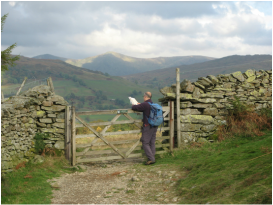Counselling SupervisionFor over fifteen years I have been offering supervision to counsellors. I work with Person-centred therapists, and also with those from other theoretical backgrounds including Cognitive-Behavioural, Psychodynamic, and Integrative therapies. My approach to supervision involves an active encouragement for you to find, develop, and sustain the way of working that best suits your skills and personality. Over the years I have worked with newly qualified and experienced practitioners as well as with students. I have for many years been an approved supervisor on the postgraduate programmes in Counselling and Psychotherapy at several Scottish universities and independent training providers, and am part of a team of Professional Development Tutors at Edinburgh University.
Supervision is a particular kind of professional conversation. The supervision I attempt to offer is inspired by Tony Merry's collaborative enquiry, Keith Tudor and Mike Worrall's encouragement to think, question, and roam imaginatively, Elke Lambers' emphasis on the developing and congruent humanity of the therapist. I am also influenced by Brigid Proctor's descriptions of the 'normative, formative, and restorative' functions of supervision, and by Michael Paterson's facilitation of values-based reflection. Supervision offers a regular opportunity to reflect on your work with clients; to celebrate what is going well and to pay attention to those things which are possibly not. It aims to support well-being and safety of practitioners and clients, and is increasingly viewed as an important safeguard for the public. I attempt to listen 'without agenda' as Ernesto Spinelli puts it, in order to allow you to look at things holistically. Through this, my task is to support you to 'hear' and experience yourself more fully, in order for you to be able to meet, understand, and respond to your clients more fully. In supervision, significant time is spent looking at specific aspects of client work (sometimes described as 'case work supervision') including the central importance of the developing relationship. Time is also spent looking at how your work is affecting you, and perhaps at how your wider life is affecting your client work for good or ill. Other areas of exploration may include:
Supervision is your time to explore the issues of importance to you in a respectfully supportive and challenging environment. Whilst it shares many features with therapy, its significant difference is that the meetings are ultimately at the service of your work and your clients. The areas outlined above are therefore always 'on the menu'. Working Agreement Please read and sign this Working Agreement. In conjunction with the information on this page, it forms the basis of our work together. |

'(Time to) ... reflect, to think, and to question; ... to be curious, critical, and creative.' Tudor and Worrall 'The function of the supervisor, then, is to create an atmosphere that will enable the supervisee to find his or her own style of being a therapist. By doing so, the supervisor also models the growth-promoting environment of congruence, acceptance, and empathy.' Villas-Bowen |
